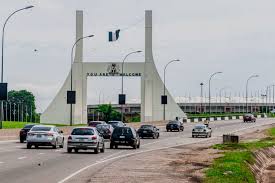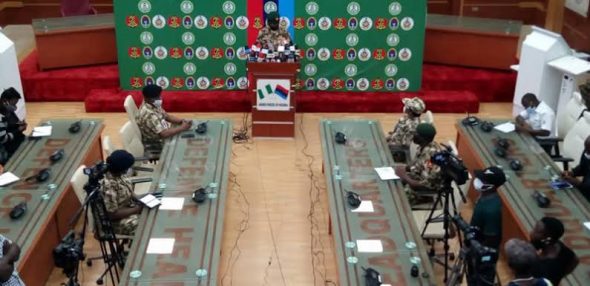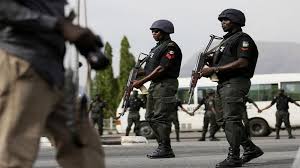
Daniel Otera
Despite renewed concerns raised by the United States Embassy, available security data and operational trends suggest that Abuja, Nigeria’s capital, remains relatively insulated from the volatile threats plaguing other parts of the country.
On 22 June 2025, the United States Mission in Nigeria issued a travel advisory restricting its personnel and their families from undertaking non-official travel to military and government facilities within the Federal Capital Territory (FCT).
Citing unspecified “global security concerns,” the embassy did not reference any specific local threat. Nonetheless, the notice triggered widespread anxiety online and reignited national conversations about public safety in Abuja.
The announcement quickly sparked mixed reactions on social media. While some dismissed the advisory with sarcasm, others voiced genuine concern:
“If dem wan bomb somewhere, make dem tell us ooo,” wrote @MYKSNIX.
“Why did the US warn its citizens to avoid military and government facilities in Abuja?” asked @Tatafomk.
“A visitor in whatever capacity comes to your home and issues a safety alert? Under what basis?” queried @emmaerudite.
“Make dem no try drop anything for here oo, we get our own rocket,” joked @Alphamgram11.
While emotionally charged, such comments reflect growing frustration with perceived external interference, compounded by domestic insecurities.
The advisory, published on the US Embassy’s website and widely circulated by national dailies, forms part of a broader wave of global alerts triggered by escalating hostilities between Iran and Israel. Just a day earlier, on 22 June, the US State Department issued a worldwide caution to American citizens to “exercise increased vigilance” in light of potential retaliatory attacks and disruptions targeting capitals and Western-linked locations.
Since then, embassies in Saudi Arabia, Turkey, and Jerusalem have issued similar restrictions or security warnings to staff. However, such advisories are generally precautionary and do not necessarily indicate imminent threats to the host country.
This is not the first time Abuja has been the focus of such alerts. In October 2022, the US Mission ordered the evacuation of diplomatic staff family members, citing fears of terrorist activity. Security was heightened across the capital, yet no attack materialised. That incident, like the current one, points to a pattern where foreign embassies issue broad advisories more reflective of global caution than verified, local intelligence.
In response to the latest development, Nigeria’s Minister of Information and National Orientation, Mohammed Idris, reassured citizens that there was “no cause for alarm,” describing Abuja as safe and urging residents to continue their daily activities without fear.
A closer look at verified incident data supports the government’s position. According to the Nigeria Security Tracker (NST), compiled by the Council on Foreign Relations, the FCT has seen fewer security incidents compared to states like Kaduna, Zamfara, Niger, and Benue.
Although comprehensive 2025 data remains limited, open-source security reports show that Abuja recorded only isolated incidents in Q1 2025 mostly robberies and suspected abductions in satellite towns. By contrast, the aforementioned northern states reported upwards of 40 to 50 violent incidents during the same period, ranging from banditry and kidnapping to communal clashes.
This data trend reinforces Abuja’s relative safety amid nationwide security challenges.
Abuja hosts Nigeria’s central security infrastructure, including the Defence Headquarters, Army and Police command centres, Department of State Services (DSS), and the National Counter-Terrorism Centre (NCTC). Since the high-profile alerts of 2022, the government has intensified surveillance and security operations in and around sensitive locations such as the Presidential Villa, foreign embassies, legislative buildings, and major hotels.
In 2024 alone, the Nigerian Armed Forces neutralised over 10,900 terrorists, arrested 12,500 suspects, and rescued more than 7,000 abductees, according to Defence Media Operations briefings. Most of these operations were planned and coordinated from Abuja.
Furthermore, elite tactical units such as the Police Mobile Force, DSS Strike Teams, and military Quick Response Squads have bolstered the FCT’s rapid response capacity. The expansion of inter-agency collaboration between the Armed Forces and the NCTC headquartered in Abuja has also strengthened nationwide intelligence-sharing and pre-emptive threat detection.
Despite these efforts, public confidence remains shaky. A 2023 Afrobarometer survey found that:
61% of Nigerians felt unsafe walking in their neighbourhoods at night
51% feared crime occurring in their homes
77% described Nigeria as either “somewhat unsafe” or “very unsafe”
These figures suggest that, for many citizens, government assurances often struggle to override the daily realities of insecurity.
Even when not grounded in immediate local threats, foreign advisories can carry far-reaching consequences. A 2022 academic study on African tourism and security perception found that such warnings often lead to decreased foreign investment, increased local anxiety, and unintended damage to national reputations.
In this context, the renewed advisory for Abuja, though global in scope, has revived public fears and speculative rumours including false claims of bomb threats none of which have been verified by Nigerian authorities.
While global tensions warrant vigilance, Abuja remains, by current data and comparative analysis, one of Nigeria’s more secure cities. The presence of national defence institutions, increased surveillance, and rapid response mechanisms position the capital as a strategic priority in the country’s overall security architecture.
The federal government’s call for calm is grounded in measurable improvements and structural reinforcements. Still, public scepticism is not misplaced. Residents are encouraged to stay informed through credible sources, refrain from circulating unverified claims, and report any suspicious activity to official security agencies.
Abuja, like any capital city, is not without risks. But those risks at least for now appear to be managed, and not significantly heightened by the latest international advisory.


